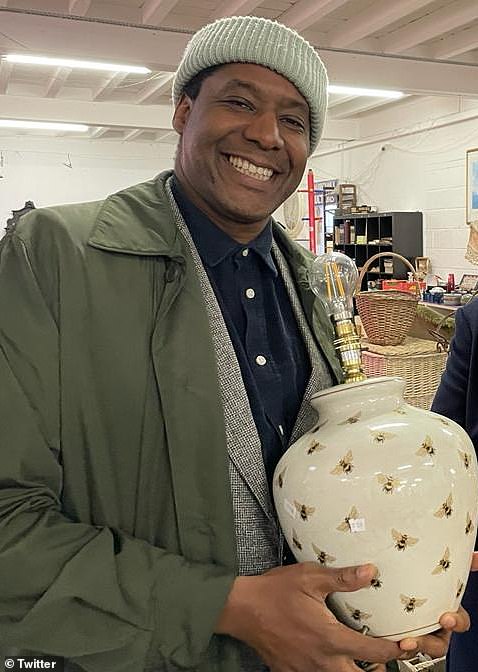
Nigerian-British art dealer, Ochuko Ojiri, has pleaded guilty to eight charges related to funding terrorism after being accused of selling artwork to a man suspected of providing finance for Hezbollah.
The 53-year-old art dealer, who has featured on the hit BBC shows for several years, attended Westminster Magistrates’ Court this morning.

He was first charged with a specific offence under section 21a of the Terrorism Act 2000.
This includes eight counts of failing to make a disclosure during business within the regulated sector, which he has now admitted.
The charges against the TV personality, whose full name is Oghenochuko Ojiri, related to a period from October 2020 to December 2021.
Ojiri, from west London, was previously the owner of a vintage shop in the capital called Pelicans & Parrots that shut its doors in October 2021.
The shop, which was dubbed ‘the coolest place in London’, sold contemporary furniture, curated houseware, and gifts.
Ojiri, an antiques specialist, first appeared on screens on the BBC’s Put Your Money Where Your Mouth Is.

Ojiri, wearing a grey suit, large clear glasses, and a blue polka dot tie, today stood in the dock at Westminster Magistrates’ Court to plead guilty to all eight charges.
Lyndon Harris, prosecuting, told Judge Briony Clarke that Ojiri had sold artwork to a man, named as Mr Ahmad, who is suspected of financing Hezbollah.
Mr Harris told the court: ‘Mr Ojiri engaged in selling artwork to a suspected terrorist financier, and at the time of the transactions Mr Ojiri knew that he had been sanctioned in the US.
‘There is one discussion where Mr Ojiri is party to a conversation where it was said he had known for years about Mr Ahmad’s activities as a suspected terrorist financier.
‘On January 10 2022 money laundering regulations came into force bringing the art sector under HMRC supervision.
‘Mr Ojiri communicated to a colleague that he knew that these regulations applied to him and his business.
‘The Ramp Gallery received advice on compliance matters but this was not properly acted on.
‘Over the course of the period, Mr Ojiri dealt with Mr Ahmad directly, negotiated sales of artwork, congratulated him on purchases, and the total value of the sales of the artwork was approximately £140,000. The art appears to have been sent to either Dubai or Beirut.’
Mr Irwin said the maximum sentence for the offences was five years, as the lawyer requested conditional bail which would require Ojiri to surrender his passport and not apply for any travel documents.
This request was granted by the Judge Briony Clarke, who committed Ojiri for sentencing at the Old Bailey in central London on June 6.
Gavin Irwin, mitigating for Ojiri, told the court: “He is not a flight risk. The fact that he is here – he has left the UK and has always returned, knowing he may be charged with offences – he will be here on the next occasion.’
The investigation that prompted the charges against Ojiri was carried out by officers from the National Terrorist Financial Investigation Unit, which is part of the Metropolitan Police’s Counter Terrorism Command.
The Treasury, HMRC, and the Met’s Arts & Antiques Unit were all also involved in the probe, police said.



